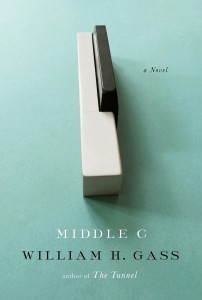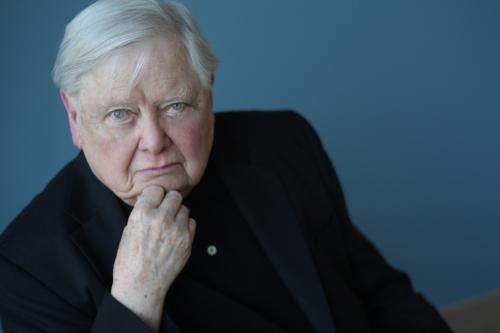Book Review: The Fine-Spun Harmonic Furies of William Gass’s “Middle C”
Despite “Middle C”’s relative cheeriness, the novel passes a tough sentence on the human race, so uncompromising that its protagonist has a hard time writing it down.
Middle C by William H. Gass. Knopf, 395 pages, $28.95.
By Peter Keough

Wrath inspires William Gass, Swiftian fury at the criminal folly of humanity, not to mention those individuals who personally affront him, and he passes a harsh sentence on his fellow mortals in his latest exhilarating novel, Middle C. Despite its bleak theme, this book might well be the most lighthearted (as much as that is possible for him at any rate) of Gass’s painstakingly produced novels (three in five decades). It is certainly his most accessible.
The middle C of the title refers to the innocent mid note on a piano keyboard and perhaps to the key of C, which can be the sunniest and most mellifluous. In addition, various passages in the text allude to the title by discussing such humdrum, inoffensive commonplaces as the middle class and the passing grade of “C.” In general, Middle C suggests that, like other literary giants such as William Gaddis (A Frolic of his Own) and Thomas Pynchon (Inherent Vice), the 88-year-old Gass has been saving, if not the best, then at least the most agreeable, for last.
Nonetheless, despite the book’s relative cheeriness, it does, as noted above, pass a tough sentence on the human race, so damningly uncompromising that the author has a hard time writing it down. It just doesn’t come out right, despite the multiple revisions that form much of the book’s structure. “The fear that the human race might not survive,” goes the first draft, “has been replaced by the fear that it will survive.” A clever paradox would be my criticism, but lacking panache, and that passive voice has to go. “The fear that the human race might not endure has been succeeded by the fear that it will survive,” the next version, does not improve matters much, and so it goes, revision after revision, until the sentence in one incarnation has metastasized into a pseudo-Jamesian, 500-word mass of clauses, qualifications, lists, and digressions. It then multiplies into numerous other unsatisfactory, supernumerary sentences to form mini-paragraphs, until, taking a hint from the 12-tone musical theories of Arnold Schoenberg, the author finds the right formula, and the sentence is complete.
That ever-revising author is Gass’s persona, Joseph Skizzen, aka “Yussel Fixel,” variously referred to as “Joey” or “Joseph” or “Professor Skizzen” depending on the situation and his conception of himself, and the 12-tone insight comes about no doubt because he is a professor of music history and theory at a small, Midwestern college. Not only are Skizzen’s musical interests very modernist, so is his identity—that is, he doesn’t have one, just the many names and a complex history that are in part, if not entirely, invented.
Blame that on his father, Rudi Skizzen, a gentile living in Graz in the days before Austria’s Anschluss with the Reich. A failed musician scratching out a living in the printing trade, he nonetheless had, as Gass puts it, employing some of the weaker examples of his favorite literary devices, the simile and the pun, “two great gifts: first, he was a seer; he saw the future as if he were reading it in one of his broadsides; and second, he was born for the stage; he had as many colors as a chameleon; he filled roles like a baker.”
Rudi was also a bit of a coward, though with a profoundly guilty conscience, for not only did he flee Austria with his family for London to escape the Reich and the Holocaust he foresaw, but he also claimed to be Jewish himself, taking on the name “Yankel Fixel” and changing the rest of the family’s names accordingly, thereby identifying himself with those who would most suffer the consequences of the evil he had fled. When that ruse is exposed, Rudi/Yankel assumes a British guise and the name “Raymond Scofield” and then . . . he disappears. Freed from her husband’s dubious patrimony, Rudi’s wife, neé Nita, now Miriam, takes the family to the United States to start a new life, but with the old surname.
Such is the post-WWII legacy Joey inherits from his dad: an innate paranoia, a knack for fakery, and a fear of exposure. But aren’t most sons and daughters arbitrarily named tabula rasas, thrust into a world ruled by seeming monsters, left to an ineluctable fate yet still expected to fill in the gaping void that is everything else? A highly developed fear of discovery distinguishes Skizzen’s case, though, the dread that his fraudulent identity, painstakingly contrived to ease his way into society even as it relieves him of personal responsibility, would be revealed, and that those deceived would denounce and destroy him.
Until then, though, Skizzen labors over his sentence, complementing it with the construction of his “inhumanity museum,” a collection of news clippings of various atrocities that support his sentence’s argument and which he hangs on strips of flypaper in his attic. Gass intercuts these later scenes, in which the complacent, tenured, bourgeois Skizzen comes off as a bumptious, mostly inoffensive version of the monstrous neo-Nazi academic in his previous novel The Tunnel, with flashbacks to his hero’s past, a bildungsroman that traces the process by which Joey/Joseph reinvents himself.
He starts out by taking a job at a record store, which requires no particular references. However, his wispy, vaguely suspicious background puts him in a weak position when a jealous co-worker sets him up as a suspect in a theft. Next he finds a job at the ramshackle, local library. Again, no experience is required, only enough wit and attractiveness to amuse his arch and enigmatic boss Miss Bruss. But to commute there he needs a car, which requires a driver’s license, and for that he needs a social security number and birth certificate. Since he’s an immigrant without papers, he forges those documents. Miss Bruss, though, has more than reshelving books in mind for him, and in a sad, slapsticky scene of sexual incomprehension worthy of Philip Roth, Skizzen gets the bum’s rush and is on his own again.
But, this being America in the economically robust ’50s, he’s not idle for long. Another opportunity arises, a position as a professor of music, for which, despite having had a few piano lessons and reading a motley selection of music books at the library, Skizzen is eminently unqualified. No problem: he cooks up a fake résumé, fabricating the place and date of birth, shamelessly exaggerating his education and experience, transforming a callow teenager into a 25-year-old man of the world, a musician educated in Vienna, a brave refugee from the Reich, and an expert on Schoenberg, whose greatest desire is to provide a home for his mother where she can, literally, tend her garden.
That last part is almost true, but the rest is pure fiction. by inventing this life, Skizzen learns that “the satisfaction he felt at being to the world an artifice was the deepest he would know.” Of course the accompanying fear of exposure is pretty intense as well and might be part of the attraction, especially with all the crazy women he must deal with. Older ones in particular, such as the unassuming, predatory Miss Bruss at the library. The pattern goes all the way back to high school, when he was nearly undone by Madame Mieux, his blowsy French teacher, who enticed him into her pillow-padded lair with offerings of marijuana and the music of Berlioz. For some reason, the maternal types find him irresistible, or maybe he is all too obviously stuck at an infantile stage of development; whatever it is they see in him, these sex-starved spinsters try to seduce him and failing that, threaten him with exposure. Which makes you wonder: is Skizzen’s problem with women Gass’s as well? I would say the misanthropy of both overshadows all other prejudices, including misogyny.
That longstanding misanthropy, more so than the overdone identity motif, provides the book with its impetus and unity. As such it draws not so much from the coldly contrived formulations of Schoenberg as from the more romanticized notions of Schoenberg’s theoretical nemesis Heinrich Schenker, who, as Skizzen observes in a moment of 12-tone apostasy, believed “that for every harmonic composition there ought to be [. . .] a hidden center—a musical idea from which the notes that would be heard emerged, and were thereby governed.”

William Gass — his latest novel playfully explores his fundamental beef with the whole kit-and-caboodle of existence.
That hidden center in Middle C—call it Gass’s fundamental beef with the whole kit-and-caboodle of existence—emerges now and then, sometimes with the fiery eloquence of a curmudgeonly prophet. But at other times, these appearances are half-hearted and perfunctory. Manifested via Skizzen’s unfinished sentence and his “Inhumanity Museum,” the fury ventures into self-parody. In interviews, Gass insists that he has modeled the book on Schoenbergian principals, explaining that it contains 12 themes and their variations. “Each theme has its own section, which it dominates,” he told a writer in the April 1 Los Angeles Review of Books. “Every theme is present to varying degrees in other parts.” Sound, he added, is more important than sense, and form is imposed on chaos by means of arbitrary artifice. This schema might account for such head-scratching inconsistencies as the book’s otherwise unaccountable anachronisms
Though dates aren’t specified, it doesn’t take too close a reading to realize that things just don’t add up. To give just one example, Skizzen apparently is born in London just before, or during the Blitz, so, approximately, let’s say, 1940. If that’s true, and since Skizzen is said to be 19 when he gets the position as professor, that means that he worked at the record shop sometime in the ’50s. If so it must have been in some Nabokovian alternative universe, because customer requests at the shop range from the Beatles and Dolly Parton to rap and grunge.
Be that as it may, Skizzen’s motive for declaring the rarefied airs of Schoenberg as his area of expertise is more pragmatic than aesthetic or philosophical. As Gass observes, his “career depended on the ignorance of others,” To maintain that public mystification Skizzen “cultivated snobbery as an essential professional weapon,” finding Schoenberg ideal for that purpose because the notoriously difficult composer “was incapable of the middle-C mind. He was unable to sustain mediocrity.”
But this affected preference also underscores the divided center of Skizzen’s character. In the following passage, one of many such tour-de-forces in the book, Gass both explains and illustrates the schizophrenic conflict between the Joseph half’s affectation for Schoenberg versus the Joey half’s preference for old folk tunes like “Polly-Wolly-Doodle.” As a further complication, this explanation is incessantly interrupted by the lyrics of the latter ditty as mutated by the ruthless system of the former, a process that in effect resolves the disharmony:
Joseph was proud of his choice of Schoenberg as a subject Doodle Wolly Polly because he had an arrogance of his own Polly Doodle Wolly a tendency to make difficulties if there weren’t any Pilly-Dilly-Dollie disliked what was proper and loved to overstep bounds Pilly-Dillie Doodle-Dollie knew words Joey professed to have no knowledge of knew words Joey professed to have no knowledge of Pilly Dillie Doodle-Dollie Woolly-Wally was angry Doodle-Dillie Doodle-Doodle-Doo not always without cause Doodle-Oodle at the idiots who were the largest element of the population Doolie-Doodle Doodle-Doody Doolie-Dilly.
“I write to indict mankind,” Gass once told a French reporter. No doubt, but the furious playfulness of the human imagination wins out — it’s hard to stay mad at anyone very long when you polly-wolly-doodle all the day.
Peter Keough, currently a contributor to The Boston Globe, had been the film editor of The Boston Phoenix from 1989 until its demise in March. He edited Kathryn Bigelow Interviews (University Press of Mississippi, 2013) and is now editing a book on children and movies for the National Society of Film Critics.

